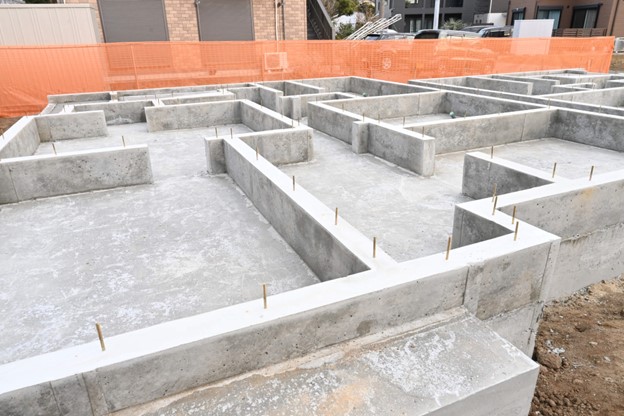Understanding and Sealing Concrete Footings

Understanding and Sealing Concrete Footings in Texas
Concrete footings are the foundation for any building, providing structural support and stability. In Texas and Louisiana, understanding and sealing concrete footings is crucial for successful construction. At Ashton Sawing and Drilling LLC, we can properly seal these footings, prolonging their lifespan, protecting them from harsh environmental factors, and ensuring the integrity of the structure they support. Below, we’ll help you learn the essentials, from understanding what sealing is to its importance, techniques, and the best products for the job.
What is Concrete Sealing?
Concrete sealing refers to applying a protective layer or treatment to concrete surfaces to enhance their durability and longevity. This process helps safeguard against moisture infiltration, chemical exposure, UV damage, and general wear and tear caused by daily use or environmental factors. Sealants can either form a protective barrier on the surface of the concrete or penetrate its pores to provide deep, long-lasting protection.
When it comes to footing concrete, which is the foundational base for many structures, sealing plays an essential role in maintaining its structural integrity. Proper sealing ensures the concrete remains strong, is resistant to cracking, and is less vulnerable to water damage or erosion. This is particularly important in areas with heavy rain, freeze-thaw cycles, or high humidity, as unsealed concrete can deteriorate quickly.
The Importance of Concrete Sealing
Sealing concrete footings is a crucial step in ensuring the longevity and stability of any structure. Here are the key benefits of sealing concrete footings:
- Prolongs Durability – Concrete footings act as the foundation for structures, transferring their weight into the ground. Without proper sealing, exposure to moisture, shifting soil, and harsh weather can deteriorate the footing and compromise its structural integrity.
- Prevents Moisture Damage – Water seepage into unsealed concrete from groundwater or rainfall can lead to cracking, surface peeling, or freeze-thaw cycles in colder areas. Sealing concrete footings effectively repels water and minimizes moisture-related damage.
- Reduces Maintenance Costs – Sealing protects the concrete early on and avoids common problems such as cracking, staining, or surface erosion, saving you from high repair costs in the future.
- Enhances Chemical Resistance – If the footings are exposed to chemicals or salts, sealing can act as a protective layer to prevent chemical reactions or breakdown, especially vital in areas like industrial zones.
When Is Sealing Required?
Determining when to seal concrete footings is critical to ensure effective protection. Here’s when you should seal concrete footings:
- Immediately After Installation – For new construction, sealing the footing concrete is best done once the concrete has fully cured. Depending on conditions, curing can take 28 days or more. Sealing during this stage offers comprehensive protection from the start.
- Periodic Maintenance – Concrete sealers don’t last forever. Most sealants require reapplication every two to five years, depending on factors like foot traffic, exposure to elements, and product quality. Promptly resealing ensures ongoing protection.
- Prior to Visible Damage – When hairline cracks or discoloration start to appear, it’s a sign to act quickly. These are the early indicators that the integrity of your footings might be at risk. Sealing at this stage can prevent further damage.
Top Sealing Techniques for Your Project
There are various sealing techniques used to protect concrete footings. Here are the most reliable ones:
- Penetrating Sealers – Penetrating sealers seep deep into the concrete to bond within its internal structure. These are ideal for footings exposed to significant environmental stress, as they provide robust protection against moisture without altering the surface’s appearance.
- Film-Forming Sealers – Film-forming sealers create a visible, protective layer on the surface of the concrete. They can provide a glossy or matte finish and are ideal in cases where appearance or additional surface protection is important.
- Epoxy Sealers – Epoxy-based systems are highly durable and often used for heavy-duty applications. They offer excellent chemical resistance, making them suitable for industrial settings or locations exposed to corrosive substances.
- Waterproof Sealers – For areas prone to water exposure, specialized waterproofing sealers can be applied. These provide a higher level of moisture protection, which is critical for concrete waterproofing services.
Expert-Approved Sealing Products for Long-Lasting Protection
Choosing the right sealing product for your specific needs is essential to effectively protect various types of footing. Below are some popular options:
- Silan-Siloxane Sealers – These sealers provide lasting moisture protection for deep penetration. They’re commonly used in commercial and residential projects.
- Epoxy Sealants – Ideal for areas requiring high durability, these create a hard, chemical-resistant layer.
- Acrylic Sealers – Budget-friendly and easy to apply, these are suitable for lighter-duty applications with a priority on aesthetics.
- Polyurethane Sealers – Known for their strength and longevity, these sealants are ideal for surfaces subjected to heavy use and weather extremes.
Safeguard Your Concrete Footings Today
Properly sealing your concrete footings is an investment in the durability and safety of your structures. Whether you’re building a new facility or maintaining an existing one, understanding the importance of concrete sealing can save you time, money, and hassle in the long run. If you’re unsure how to seal concrete or which product to use, contact us today. We’ll properly seal your footings, ensuring that your foundations stand the test of time.
